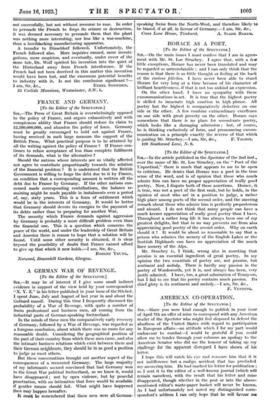[To the Editor of the SPECTATOR.]
SIR,—In the article published in the Spectator of the 2nd inst., over the name of Mr. St. Loe Strachey, on the " Poet of the Unpoetical," there is much that appears to me to be open to criticism. He denies that Horace was a poet in the true sense of the word, and is of opinion that those who much admire him can have no proper appreciation of really good poetry. Now, I dispute both of these assertions. Horace, it is true, was not a poet of the first rank, but he holds, in the opinion of most who are in a position to judge, a rather high place among poets of the second order, and the sneering remark about those who admire him is perfectly preposterous and absurd. I do not think that many people can have a much keener appreciation of really good poetry than I have. Throughout a rather long life it has always been one of my greatest delights, but that in no way prevents me from also appreciating good poetry of the second order. Why on earth should it ? It would be about as reasonable to say that a peison who admires the scenery of the English Lakes or the Scottish Highlands can have no appreciation of the much finer scenery of the Alps.
Mr. Strachey is, I think, wrong also in asserting that passion is an essential ingredient of great poetry. In my opinion the two essentials of poetry are, not passion, but sentiment and melody. There is hardly any passion in the poetry of Wordsworth, yet it is, and always has been, very justly admired. I have, too, a great admiration of Tennyson, but I fail to see that his poetry contains much passion. Its chief glory is its sentiment and melody.—I am, Sir, &c.,
F. YENNING.






































 Previous page
Previous page